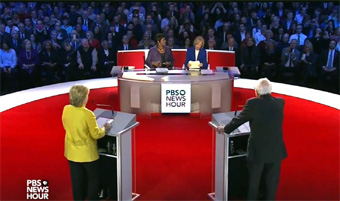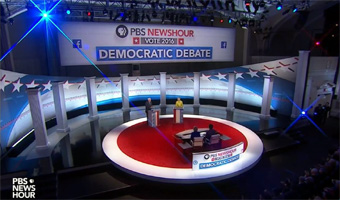
Images courtesy of PBS
Democratic Debate on PBS:
Wall Street Still a Thorny Issue
| published February 12, 2016 |
By R. Alan Clanton, Thursday Review editor
In a crucial debate on PBS which came only ten days before the voters of South Carolina go to the polls to pick their choice for the next President, Hillary Clinton and Bernie Sanders faced off in a sometimes heated debate in Milwaukee, Wisconsin.
The debate also came just days after Clinton, the presumptive front-runner for more than one year, sustained a substantial defeat in the New Hampshire primary, where voters validated Sanders’ message by giving him more than 60% of the vote in a state once considered strong Clinton country. When all the votes were counted, Clinton walked away with 38% of the Granite State vote.
Most political analysts now believe that the race for the Democratic nomination—once Clinton’s to win or lose—could now stretch on for many weeks as Sanders and Clinton battle for the heart and soul of Democrats. Top Clinton campaign strategists, however, insist that Clinton will bounce back with a big win in South Carolina, where Clinton support runs high, and where the majority of registered Democrats are African-American, a group which supports Clinton in that state by a whopping 85%. After South Carolina, the campaign moves toward Super Tuesday and Florida—more areas where Southern and Midwestern states may skew heavily toward Clinton, and where Sanders’ quasi-socialist appeal may fall flat.
Still, Sanders’ campaign strategists are hopeful, and even many close to the Clinton’s worry that she may be facing a grim repeat of her 2008 primary battles with Barack Obama, when she saw support begin to taper off after several early losses. Some recent national polls show that Clinton no longer maintains the healthy lead of Sanders; still other polls show the gap closing fast, even in states once thought to be safe for Clinton.
Thus the stage was set for what soon became a contentious and often intense exchange of punches and counter-punches between the two remaining Democratic candidates.
In their opening statements at the University of Wisconsin, both the former Secretary of State and the Vermont Senator fired their opening salvos into the fray, each attempting within the first few moments to draw sharp distinctions with each other. Though both candidates were quick to state that they were in broad agreement on many of the major issues, Sanders stressed that his proposals—which he readily admits are part of a radical, top-down restructuring of government—represents a sharp, even revolutionary departure from anything that Clinton could offer.
Likewise, the former Secretary of State pressed Sanders hard on the realities and costs of his proposals, stressing her view that very few economists think Sanders’ economic plan would be fiscally possible, much less responsible. Clinton also pounded Sanders hard on the vast costs of his educational proposals, which includes his centerpiece plan to provide free college education to any young person.
Sanders has insisted that every one of his expansive proposals are paid for—or will be paid for—through a combination of tax increases on high earners, a real reduction in the cost of certain items such as health care and prescription drugs, the closing of tax loopholes which allow money to be moved easily offshore, and by introducing legislation which would require U.S. companies to pay taxes for monies earned in, or moved to, foreign countries.
And though each found basic agreement on issues or race and race relations, the debate revealed some sharp differences on the issue of immigration, specifically on the issue of the tens of thousands of children who migrated in 2013-2014 from war torn areas and from cities and towns where drug violence has become common. Clinton said that the Obama was policy of detaining and returning the children was the prudent and reasonable measure in order to send a message to the human traffickers and smugglers; Sanders said that the right thing to do would have been to help these children find a path into the United States, and suggested that it was inhumane to force most of the young migrants to return to homes where war, violence and drug gangs are a daily way of life.
But for the first hour or more, it was economics and Wall Street which dominated the debate, a conversation which at times turned bitter and contentious. On this point, Sanders feels he has the high ground, and the Vermont Senator made it clear he intended to carry the theme of Clinton’s coziness with Wall Street into the primaries and caucuses ahead. Clinton, at times combative, struck back hard, in effect challenging to Sanders to explain his suggestion that she would be held under the sway of Wall Street, and vowing that she too would be willing to take on the big banks, special interests, financial institutions, and even the pharmaceutical industry.
PBS moderator Judy Woodruff asked Clinton the toughest question of the night: how can she square the circle, as it were, on the issue perhaps most troubling for her quest to pry progressive support away from Sanders and his powerful theme of inequality, especially in the context of massive campaign contributions by Wall Street firms like Goldman Sachs and Citibank, and vast donations from billionaire donors. Clinton brushed aside those billionaires—among them George Soros—who have given many millions to support her candidacy, by explaining that those givers were donating directly to a political action committee (PAC) over which neither she nor her campaign staff have any control.
Sanders pounced, telling the audience that Clinton doesn’t get “a pass” just because she suggests that the actions of her Super PAC are disconnected from the decisions made by her campaign staff. Sanders also returned to a familiar theme, asking the rhetorical question he says requires examination: why would companies like Goldman Sachs, Bank of America, Citibank, or any one of dozens of pharmaceutical or defense firms, donate such massive troves of cash unless they expected something in return? Sanders insisted that real campaign finance reform is required, and—without stating Clinton’s name directly—suggested that Clinton has received too much cash from Wall Street and other big donors to be a genuine reformer when it comes to the banks and large corporations.

The question came back up when it was repackaged by PBS moderator Gwen Ifill. Ifill pressed both candidates on national polls, and exit polls conducted in Iowa and New Hampshire, which show that Americans are angry and frustrated with government—and a lack of proactivity and effectiveness in solving the country’s numerous problems. Some polls show even a majority of Democrats are angry with government, and dissatisfied with the notion that government is the solution.
But Clinton sought to draw a distinction between her proposals and those of Sanders.
“It is absolutely fair and necessary,” Clinton said, “for Americans to vet both our proposals, [and] to ask the very hard questions about what it is we think we can accomplish…why do we believe that…and what would be the results for the average American family. In my case, whether it’s health care, or getting us to debt-free tuition, or moving us toward paid family leave, I’ve been very specific about where I would raise the money, how much it would cost, and how I would move this agenda forward.”
Both Sanders and Clinton insisted that they would pay for the cost of their programs through tax increases on the wealthy, and by closing tax loopholes which allow for vast sums of money earned and collected in the U.S. to be moved overseas.
When Clinton spoke as if her proposals were already being vetted by those who manage the levers and gears inside Washington, Sanders served-up the sarcastic barb, “Secretary Clinton, you’re not in the White House yet.” Sanders went on to stress that his proposals, arguably more sweeping than those offered by Clinton, would be easily paid for by the increased revenues resulting from closing tax loopholes and forcing American businesses to bring taxable cash back to the U.S. Sanders also stressed that as long as American companies found it easier to simply move jobs overseas—especially to Asia—domestic social programs and spending would always suffer mightily as thousands more each month become unemployed or underemployed.
Sanders was willing also to criticize President Obama on his perceived coziness to Wall Street in the early days of his administration, and by extension, to suggest that Clinton is beholden to many of the big banks and financial institutions which brought the economy into deep recession in 2008. Sanders has referred to Obama’s approach to Wall Street and the big banks as “weak,” and in a blurb for the Bill Press book Buyer’s Remorse: How Obama Let Progressives Down, Sanders wrote a short blurb in which he piled-on, criticizing Obama as being highly ineffective in addressing the power and size of large banks. (Among other things, Sanders wrote, “…long after taking the oath of office, the next President of the United States must keep rallying the people who elected him or her on behalf of progressive causes,” an apparent dig at Obama’s rapid coziness with Wall Street upon entering the Oval Office in 2009.)
Clinton, in effect, was backed into a corner in which she felt compelled to defend Obama, while at the same time distancing herself from some of the worst blowback which still angers many progressives.
“I don’t think he [President Obama] gets the credit he deserves,” Clinton said, “for being a President who got us out of that ditch, put us on firm ground, and sent us into the future.” Clinton paused as the room erupted in applause. But she wasn’t finished with her comments to Sanders. “The kind of criticism we’ve heard from Senator Sanders about our President, I expect from Republicans… I do not expect [it] from someone running for the Democratic nomination to succeed President Obama!”
Sanders called the remark “a low blow,” and insisted that it was not only fair but reasonable that progressives might disagree with Obama on specific issues. Sanders says he was a friend to the Obama administration and worked with the President on scores of projects, but said that in a democracy it was to be expected that a Democratic U.S. Senator might disagree with a Democratic President even on some key issues—such as trade deals in the Pacific and gun control. But Clinton bore down on the issue of Sanders and his sometimes notable, high-profile disagreements with Obama, telling the audience that Sanders’ frequent differences with the President are “ones that I find particularly troubling.”
Sanders retorted that of the two, only Clinton actually ran against Obama.
Related Thursday Review articles:
Wall Street Takes Center Stage in Democratic Debate; R. Alan Clanton; Thursday Review; February 5, 2016.
Hillary Clinton, Ted Cruz, Jeb Bush, and the Goldman Sachs Thing; R. Alan Clanton; Thursday Review; February 4, 2016.
